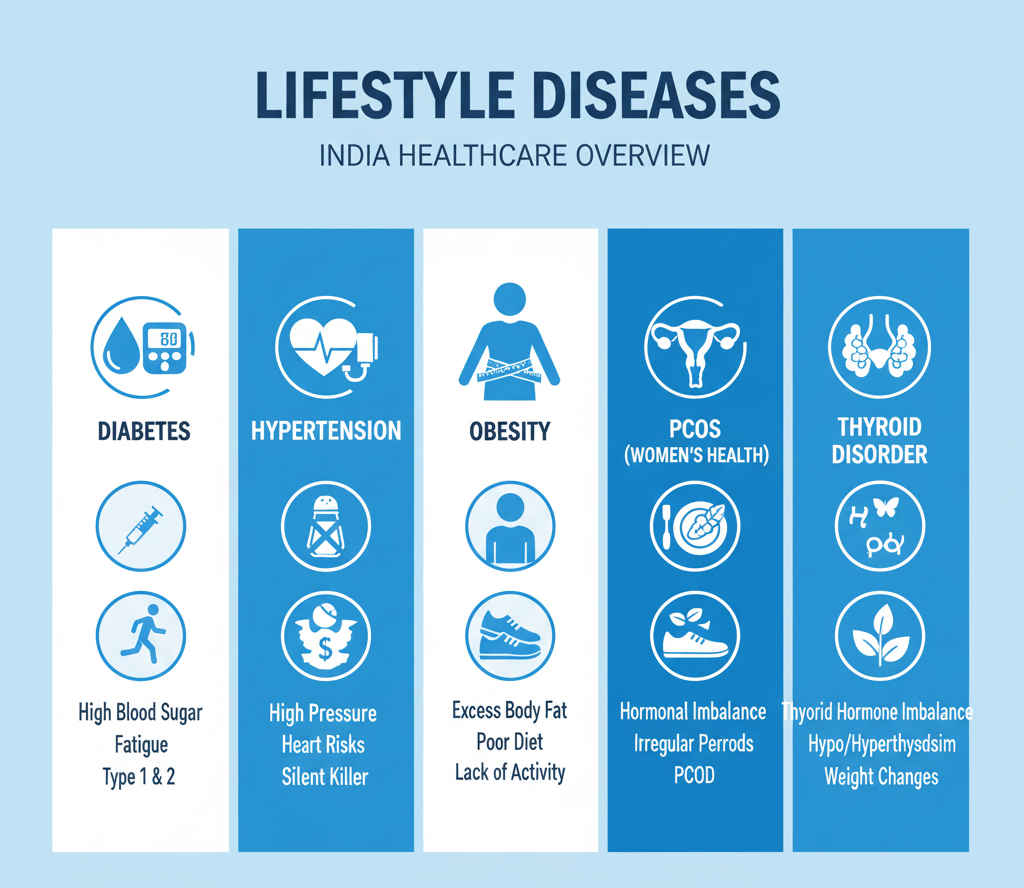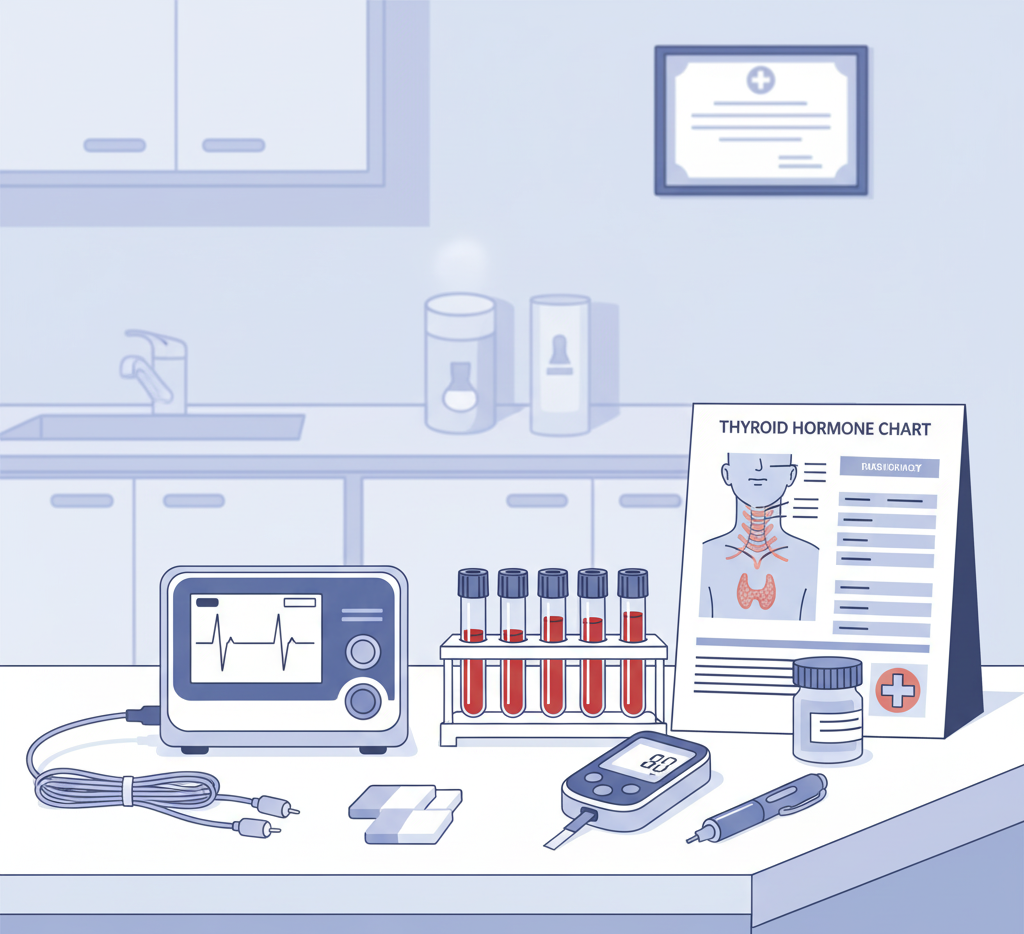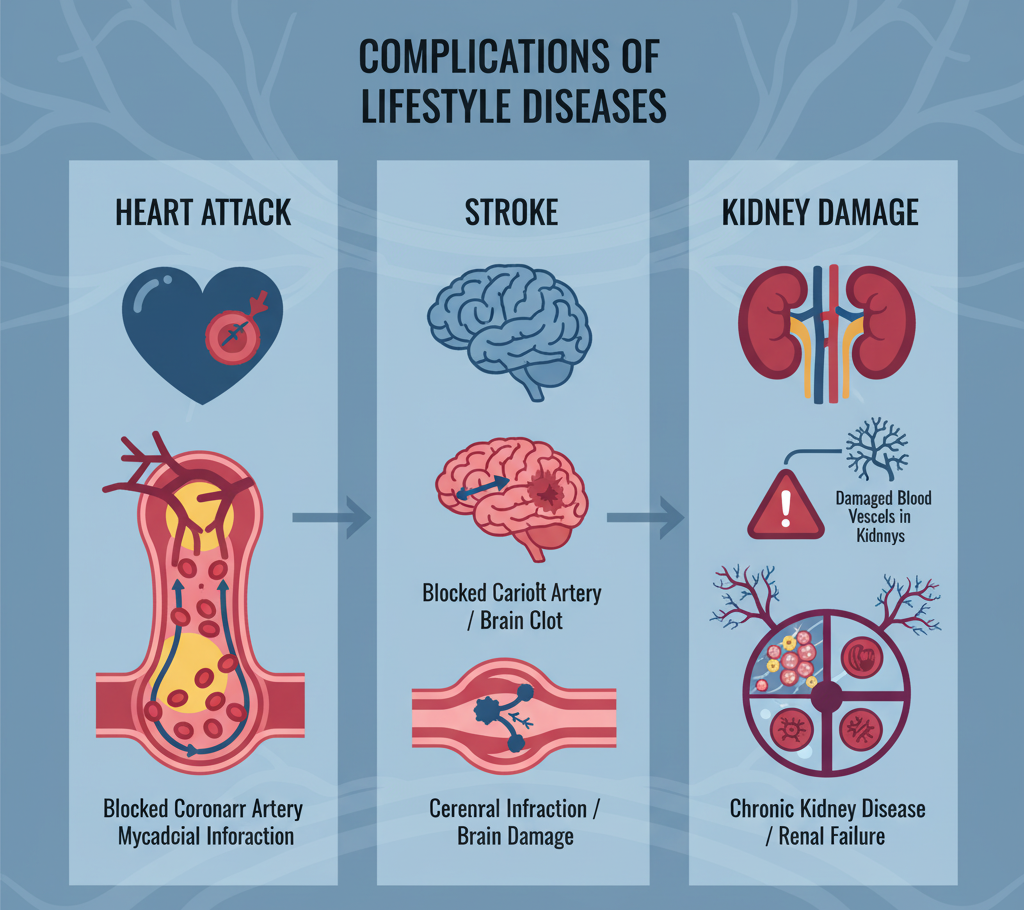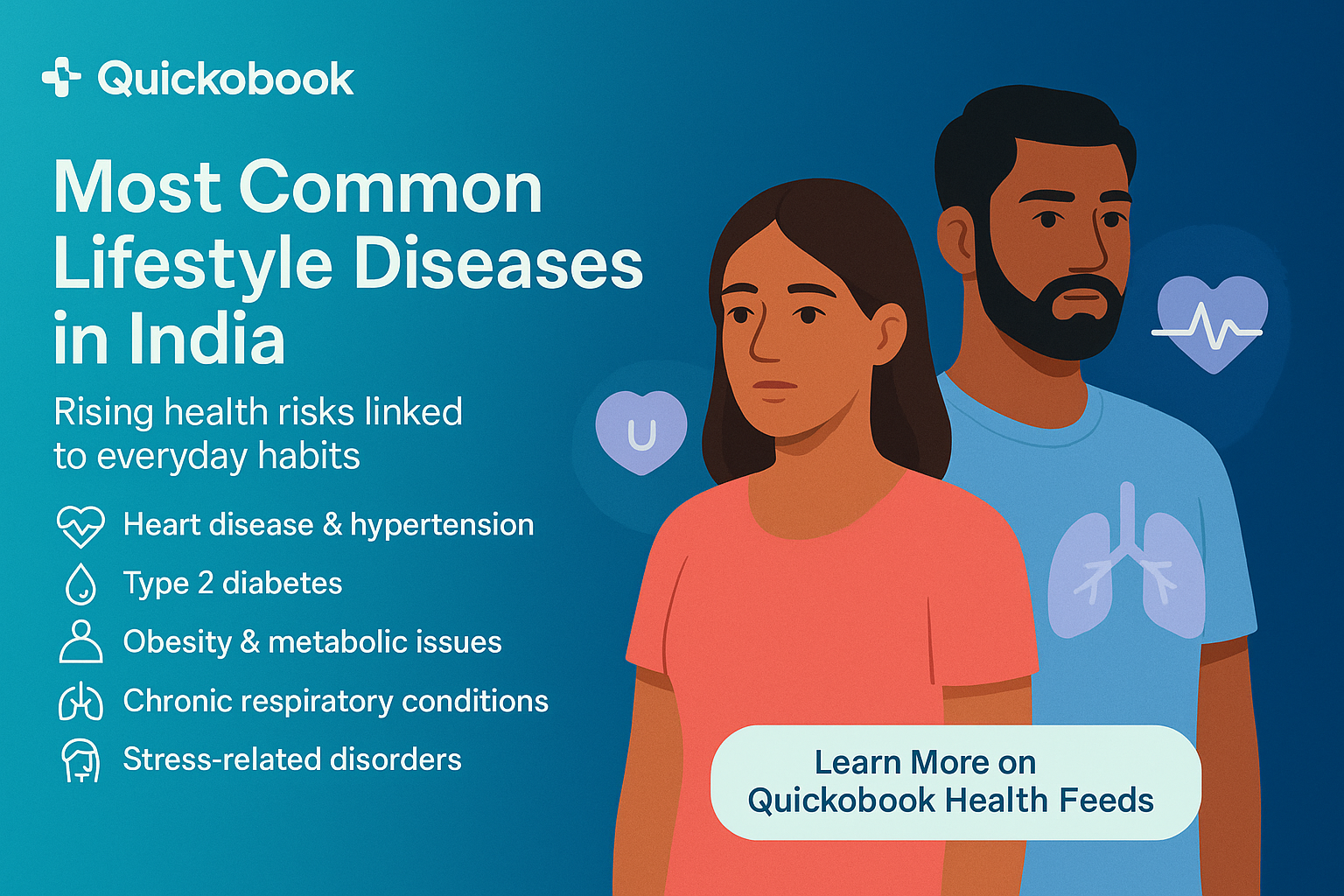Introduction
Lifestyle diseases have become one of the biggest health challenges in India. These conditions occur due to everyday habits like unhealthy eating, physical inactivity, stress, lack of sleep, and tobacco or alcohol use. Today, lifestyle diseases are affecting people across all age groups—children, young adults, and seniors. With the right information and timely medical care, these conditions can be prevented or controlled. Early diagnosis plays a major role in improving outcomes and preventing severe complications.
This blog will help you understand the most common lifestyle diseases in India, what causes them, how to identify symptoms early, and how to manage them effectively.
What Are Lifestyle Diseases?

Lifestyle diseases are long-term health conditions caused by the way we live. They are also known as non-communicable diseases (NCDs). Unlike infections, these illnesses develop slowly over time and are linked to habits related to diet, exercise, sleep, and stress.
In India, the most common lifestyle diseases include diabetes, high blood pressure, heart disease, obesity, thyroid disorders, PCOS, high cholesterol, and certain mental health conditions. These diseases have become common even among younger people due to sedentary routines, processed food diets, and increased workplace stress.
Most Common Lifestyle Diseases in India
Diabetes (Type 2 Diabetes):
India is known as the diabetes capital of the world. Type 2 diabetes occurs when the body cannot use insulin properly. Symptoms include frequent urination, increased thirst, tiredness, slow wound healing, and sudden weight changes.
Hypertension (High Blood Pressure):
Hypertension rarely has symptoms but can damage the heart, kidneys, and brain over time. Stress, salt-heavy diets, and lack of physical activity are major triggers.
Heart Disease:
Blocked arteries, weakened heart muscles, and irregular heart rhythms contribute to heart disease. Chest pain, breathlessness, fatigue, and swelling are common warning signs.
Obesity:
A growing concern in urban and rural India. Obesity increases the risk of diabetes, heart disease, sleep disorders, and joint pain.
Thyroid Disorders:
Hypothyroidism and hyperthyroidism affect metabolism. Symptoms range from weight gain, fatigue, and hair fall to anxiety and heart palpitations.
PCOS (Polycystic Ovary Syndrome):
A hormonal condition affecting young women. It causes irregular periods, weight gain, acne, excess facial hair, and fertility issues.
High Cholesterol:
Too much LDL cholesterol can block arteries, increasing the risk of stroke and heart attack.
Fatty Liver Disease:
Common among those who eat high-fat diets or consume alcohol. Symptoms include digestion issues, tiredness, and abdominal discomfort.
Stress-Related Disorders:
Chronic stress contributes to insomnia, anxiety, depression, and high blood pressure.
Causes of Lifestyle Diseases
Lifestyle diseases develop due to long-term unhealthy habits. Some common causes in India include:
-
Eating processed foods high in salt, sugar, and unhealthy fats
-
Sitting for long hours at work or school
-
Lack of physical activity
-
Overuse of mobile phones, TVs, and devices
-
Poor sleep routines
-
Stress at work, home, or in relationships
-
Smoking and alcohol
-
Urban pollution
-
Ignoring early symptoms or skipping checkups
Symptoms to Watch For
Although symptoms vary by condition, here are common warning signs linked to lifestyle diseases:
-
Unexplained weight gain or loss
-
Frequent tiredness
-
Headaches
-
Excessive thirst or urination
-
Breathlessness
-
Chest discomfort
-
Irregular periods
-
Joint pain
-
Increased stress or irritability
-
Hair fall
-
Sleep problems
If you notice any of these, visit a general physician for early diagnosis.
Importance of Early Diagnosis
Early diagnosis is one of the strongest tools in managing lifestyle diseases. Detecting conditions early helps:
-
Prevent complications such as stroke, heart attack, kidney damage, or infertility
-
Start treatment at the right time
-
Improve long-term health outcomes
-
Reduce medical costs
-
Improve quality of life
Simple tests like blood sugar, lipid profile, thyroid function tests, liver function tests, and blood pressure checks can help catch issues early.
Diagnosis Methods Used in India

Doctors may recommend the following diagnostic tests:
-
Blood sugar test for diabetes
-
HbA1c for long-term sugar monitoring
-
Lipid profile for cholesterol levels
-
Thyroid test (TSH/T3/T4)
-
Liver function test
-
ECG and Echo for heart health
-
Hormonal tests for PCOS
-
BMI and waist measurement for obesity
These tests are easily available at clinics, hospitals, and diagnostic centers across India.
ALSO READ: Longevity Expert Ranks The 7 Most Effective Science-backed Ways To Control Blood Sugar
Treatment Options
Treatment depends on the condition but usually includes:
-
Lifestyle modifications
-
Medication as prescribed by a doctor
-
Regular monitoring through follow-up checkups
-
Dietary changes
-
Stress management
-
Avoiding alcohol and smoking
-
Weight management plans
Never start or stop medicines without consulting a doctor. Dosage and duration are always determined by a medical professional.
Lifestyle Modifications for Better Health
Managing lifestyle diseases starts with healthy habits:
-
Eat more fresh fruits, vegetables, and whole grains
-
Reduce sugar, salt, and fried food
-
Exercise at least 30–45 minutes daily
-
Sleep 7–8 hours every night
-
Drink enough water
-
Reduce mental stress through yoga or meditation
-
Avoid smoking and alcohol
-
Take regular medical checkups
Prevention Strategies
You can prevent lifestyle diseases by adopting simple daily practices:
-
Maintain a healthy weight
-
Get checked regularly
-
Choose home-cooked meals
-
Keep your cholesterol and sugar levels in check
-
Follow your doctor’s advice
-
Stay active throughout the day
-
Limit screen time
-
Practice mindful eating
-
Make preventive healthcare a priority
When to See a Doctor
Visit a doctor if you experience:
-
Persistent tiredness
-
Chest pain
-
Irregular heartbeat
-
Sudden weight changes
-
Frequent urination or extreme thirst
-
Persistent headaches
-
Sleep disturbances
-
Long-term stress or low mood
Early diagnosis can prevent serious complications.

Risks and Complications
If lifestyle diseases are not managed properly, they can lead to:
-
Stroke
-
Kidney damage
-
Vision loss
-
Nerve damage
-
Infertility
-
Liver cirrhosis
-
Mobility issues
-
Reduced life expectancy
50 FAQs (Q → A)
-
What are lifestyle diseases?
They are long-term health conditions caused by unhealthy daily habits. -
Which lifestyle diseases are most common in India?
Diabetes, hypertension, heart disease, obesity, thyroid issues, PCOS, and high cholesterol. -
Are lifestyle diseases preventable?
Yes, most can be prevented with a healthy lifestyle. -
Why are lifestyle diseases increasing in India?
Poor diet, lack of exercise, long working hours, and stress contribute. -
What role does early diagnosis play?
It helps detect problems early and prevents complications. -
What foods increase the risk of lifestyle diseases?
Junk food, sugar-loaded drinks, fried foods, and processed snacks. -
How often should I check my blood sugar?
Your doctor will guide you, but regular monitoring is essential. -
Can children develop lifestyle diseases?
Yes, childhood obesity and early diabetes are rising. -
Is stress linked to lifestyle diseases?
Yes, stress increases the risk of BP, heart disease, and mental disorders. -
Can I reverse diabetes?
Some cases improve with weight loss and lifestyle changes, under medical supervision. -
Does lack of sleep cause lifestyle diseases?
Poor sleep increases the risk of obesity, diabetes, and hypertension. -
What are symptoms of high cholesterol?
Often none—testing is needed. -
Is PCOS a lifestyle disease?
Yes, it is influenced by weight, hormones, and genetics. -
How is hypertension diagnosed?
Through repeated blood pressure readings. -
Can lifestyle diseases cause infertility?
Yes, conditions like PCOS and diabetes can affect fertility. -
What is the best diet for prevention?
A diet rich in fruits, vegetables, whole grains, and lean proteins. -
Can smoking cause lifestyle diseases?
Yes, smoking leads to heart disease, lung disease, and cancers. -
How much exercise is needed?
At least 30 minutes of daily physical activity. -
Can obesity cause high blood pressure?
Yes, excess body weight increases BP risk. -
What is a lipid profile test?
It measures good and bad cholesterol levels. -
What is HbA1c?
A test that shows average blood sugar of the past 3 months. -
Are lifestyle diseases genetic?
Family history increases risk. -
Can thyroid disorders be controlled?
Yes, with medication and regular tests. -
Does alcohol increase disease risk?
Yes, it raises BP, liver damage, and cancer risk. -
What is fatty liver disease?
Fat deposits build up in the liver due to diet, obesity, or alcohol. -
Can young adults get hypertension?
Yes, it’s now common between ages 20–35. -
Does weight loss improve lifestyle diseases?
Yes, reducing weight helps control sugar, BP, and cholesterol. -
What is the safest cooking oil?
Oils like olive, mustard, and groundnut are healthier options. -
Are lifestyle diseases curable?
They can be managed well with treatment. -
Can stress cause heart problems?
Yes, chronic stress affects heart function. -
What are signs of diabetes?
Frequent urination, thirst, tiredness, and slow healing. -
How can I prevent obesity?
Eat balanced meals and stay active daily. -
Is fasting good for lifestyle diseases?
It may help some people but should be supervised by a doctor. -
What is metabolic syndrome?
A combination of high BP, high sugar, and obesity. -
Can lifestyle diseases cause depression?
Yes, long-term conditions can affect mental health. -
What is the role of a general physician?
They diagnose, treat, and guide preventive care. -
Can yoga prevent lifestyle diseases?
Yes, yoga reduces stress and improves fitness. -
How does diet affect diabetes?
Sugary and refined foods increase glucose levels. -
What is insulin resistance?
When cells stop responding to insulin, increasing sugar levels. -
Does family history matter?
Yes, it increases your risk. -
What tests should adults do yearly?
Sugar, cholesterol, BP, thyroid, and liver tests. -
Can home remedies cure lifestyle diseases?
No, but they may help when combined with medical care. -
Which age group is most affected?
Adults aged 25–60, but younger groups are rising. -
Is BMI reliable for obesity?
Yes, but waist measurement is also important. -
Can cholesterol cause stroke?
Yes, blocked arteries increase stroke risk. -
What is prediabetes?
Higher-than-normal sugar levels, but not diabetes yet. -
What is the main cause of obesity?
High-calorie foods and a sedentary lifestyle. -
How often should BP be checked?
At least once every 6 months or more if advised. -
Can diet alone control hypertension?
It helps, but some people also need medication. -
How can I keep lifestyle diseases away long-term?
Eat well, exercise, sleep well, reduce stress, and get regular checkups.
Conclusion
Lifestyle diseases are becoming increasingly common in India, but early diagnosis and timely treatment can prevent major complications. Simple lifestyle changes, regular checkups, and consulting a qualified general physician can help you stay healthy. Your day-to-day habits matter more than you think, and making small positive changes can protect you from long-term health issues.
Quickobook CTA
If you notice any symptoms or want preventive health checkups, book an appointment with a verified general physician on Quickobook today.
Quickobook connects you to trusted doctors across India, offering easy online booking, affordable consultations, and quick appointments.
Take charge of your health—your wellness starts with one checkup.
Disclaimer
This blog is for educational purposes only and does not replace professional medical advice. Always consult a qualified doctor for diagnosis and treatment. Medicine dosage should only be determined by your doctor.










Comments (0)
No comments yet. Be the first to share your thoughts!
Leave a Comment